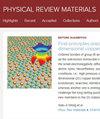Mechanical regularization
IF 3.4
3区 材料科学
Q2 MATERIALS SCIENCE, MULTIDISCIPLINARY
引用次数: 0
Abstract
Training materials through periodic drive allows us to endow materials and structures with complex elastic functions. As a result of the driving, the system explores the high-dimensional space of structures, ultimately converging to a structure with the desired response. However, increasing the complexity of the desired response results in ultraslow convergence and degradation. Here, we show that by constraining the search space, we are able to increase robustness, extend the maximal capacity, train responses that previously did not converge, and in some cases accelerate convergence by many orders of magnitude. We identify the geometrical constraints that prevent the formation of spurious low-frequency modes, which are responsible for failure. We argue that these constraints are analogous to regularization used in machine learning. We propose a unified relationship between complexity, degradation, convergence, and robustness.

机械正则化
通过周期性驱动对材料进行训练,我们可以赋予材料和结构以复杂的弹性功能。驱动的结果是,系统探索结构的高维空间,最终收敛到具有所需响应的结构。然而,增加期望响应的复杂性会导致超慢收敛和退化。在这里,我们展示了通过限制搜索空间,我们能够提高鲁棒性、扩展最大容量、训练以前无法收敛的响应,并在某些情况下将收敛速度加快许多数量级。我们确定了防止形成虚假低频模式的几何约束,而虚假低频模式是导致故障的原因。我们认为,这些约束类似于机器学习中使用的正则化。我们提出了复杂性、退化、收敛性和鲁棒性之间的统一关系。
本文章由计算机程序翻译,如有差异,请以英文原文为准。
求助全文
约1分钟内获得全文
求助全文
来源期刊

Physical Review Materials
Physics and Astronomy-Physics and Astronomy (miscellaneous)
CiteScore
5.80
自引率
5.90%
发文量
611
期刊介绍:
Physical Review Materials is a new broad-scope international journal for the multidisciplinary community engaged in research on materials. It is intended to fill a gap in the family of existing Physical Review journals that publish materials research. This field has grown rapidly in recent years and is increasingly being carried out in a way that transcends conventional subject boundaries. The journal was created to provide a common publication and reference source to the expanding community of physicists, materials scientists, chemists, engineers, and researchers in related disciplines that carry out high-quality original research in materials. It will share the same commitment to the high quality expected of all APS publications.
 求助内容:
求助内容: 应助结果提醒方式:
应助结果提醒方式:


